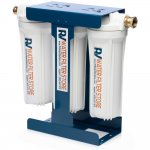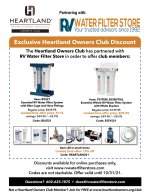2Stepn
Member
This is the first trailer I've owned with a Suburban water heater.
In my former trailers I've had Atwood water heaters with a drain valve installed. At the end of each trip I would just open the drain valve and drain the water heater. I did this to prevent water odor problems from occurring from using well water and warm Temps.
The suburban water heater with its anode rod/drain plug combo. is slightly more difficult to drain.
What have your experiences with water odor problems and the suburban water heater been while using untreated well water. Does the anode rod help, or should I continue to drain after each trip.
Thanks Bill
In my former trailers I've had Atwood water heaters with a drain valve installed. At the end of each trip I would just open the drain valve and drain the water heater. I did this to prevent water odor problems from occurring from using well water and warm Temps.
The suburban water heater with its anode rod/drain plug combo. is slightly more difficult to drain.
What have your experiences with water odor problems and the suburban water heater been while using untreated well water. Does the anode rod help, or should I continue to drain after each trip.
Thanks Bill


